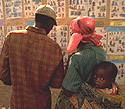
Who we are...
UNICEF is the driving force that helps build a world where the rights of every child are realized. We have the global authority to influence decision-makers, and the variety of partners at grassroots level to turn the most innovative ideas into reality. That makes us unique among world organizations, and unique among those working with the young.
We believe that nurturing and caring for children are the cornerstones of human progress. UNICEF was created with this purpose in mind – to work with others to overcome the obstacles that poverty, violence, disease and discrimination place in a child’s path. We believe that we can, together, advance the cause of humanity.
We advocate for measures to give children the best start in life, because proper care at the youngest age forms the strongest foundation for a person’s future.
We promote girls’ education – ensuring that they complete primary education as a minimum – because it benefits all children, both girls and boys. Girls who are educated grow up to become better thinkers, better citizens, and better parents to their own children.
We act so that all children are immunized against common childhood diseases, and are well nourished, because it is wrong for a child to suffer or die from a preventable illness.
We work to prevent the spread of HIV/AIDS among young people because it is right to keep them from harm and enable them to protect others. We help children and families affected by HIV/AIDS to live their lives with dignity.
We involve everyone in creating protective environments for children. We are present to relieve suffering during emergencies, and wherever children are threatened, because no child should be exposed to violence, abuse or exploitation.
UNICEF upholds the Convention on the Rights of the Child. We work to assure equality for those who are discriminated against, girls and women in particular. We work for the Millennium Development Goals and for the progress promised in the United Nations Charter. We strive for peace and security. We work to hold everyone accountable to the promises made for children.
We are part of the Global Movement for Children – a broad coalition dedicated to improving the life of every child. Through this movement, and events such as the United Nations Special Session on Children, we encourage young people to speak out and participate in the decisions that affect their lives.
We work in 190 countries through country programmes and National Committees. We are UNICEF, the United Nations Children’s Fund.
Our history
UNICEF past, present and future| 1946 |  © UNICEF/ICEF-0318 | |
 © UNICEF/ICEF-3895/Jack Ling | 1953 UNICEF becomes permanent part of the UN | |
| 1954 |  © UNICEF/HQ54-001 | |
 © UNICEF/ICEF-1887 | 1959 Declaration of the Rights of the Child | |
| 1961 Education |  © UNICEF/ICEF-4771/M & E Bernheim | |
 © UNICEF/HQ65-0002 | 1965 Nobel Peace Prize | |
| 1979 International Year of the Child |  © UNICEF/HQ93-1868/Charton | |
 © UNICEF/HQ93-1616/Lemoyne | 1981 Breastfeeding Code approved | |
| 1982 Child Survival and Development Revolution |  © UNICEF/C43-12/McCloskey | |
 © UNICEF/HQ91-0241/Toutounji | 1987 Landmark UNICEF study | |
| 1989 Convention on the Rights of the Child |  © UNICEF/HQ94-1385/Little | |
 © UNICEF/HQ90-0117/Mera | 1990 World Summit for Children | |
| 1996 Children and conflict |  © UNICEF/HQ95-0986/Chalasani | |
 © UNICEF/HQ95-0492/Lemoyne | 1998 United Nations Security Council debates children and conflict | |
| 2001 Say Yes for Children campaign launched |  | |
 © UNICEF/HQ02-0148/Markisz | 2002 Special Session on Children |
No comments:
Post a Comment